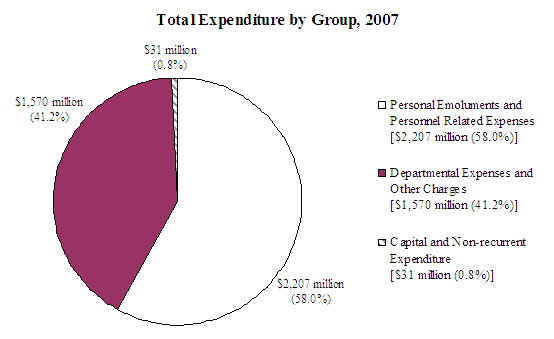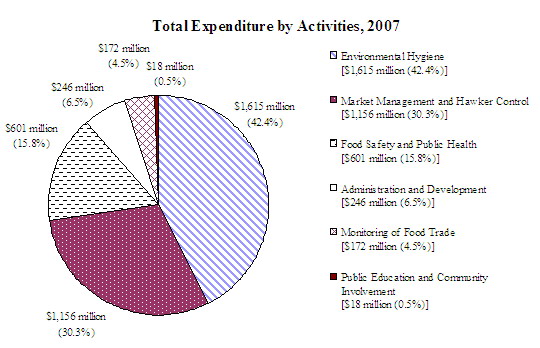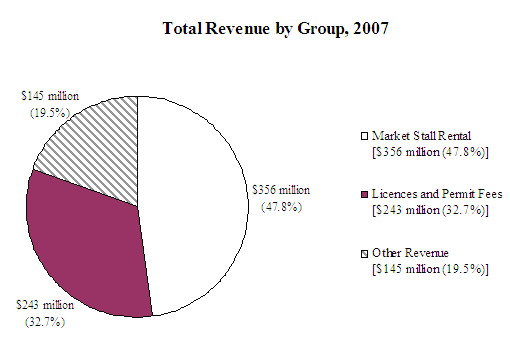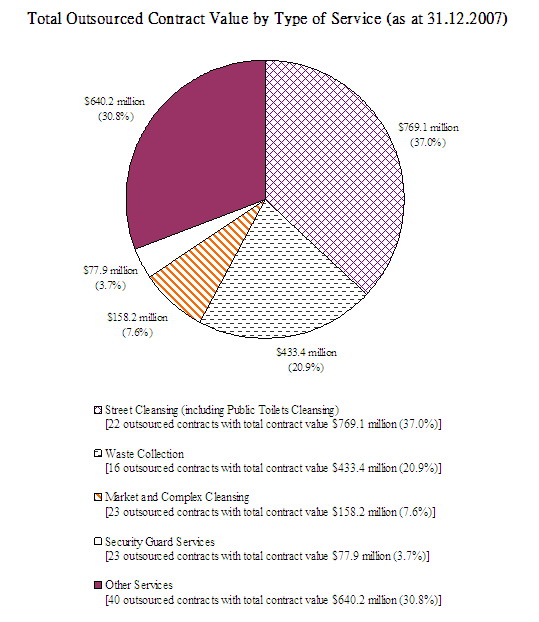The Administration and Development Branch provides various management and support services to the Department.
Grade Management
There are three major grades covering Health Inspectors, Hawker Control Officers and Foremen, with two grade managers, one for the Health Inspector grade and another for the Hawker Control Officer and Foreman grades. The grade managers are responsible for staff matters involving manpower planning, career development, postings, promotion and training.
The Health Inspector grade comprises six non-directorate ranks, namely: Senior Superintendent, Superintendent, Chief Health Inspector, Senior Health Inspector, Health Inspector I/II, and Student Health Inspector. They are responsible for various environmental hygiene and food safety functions, such as handling of environmental nuisance cases, licensing, prosecution, meat inspection, cleansing services, outsourcing, pest control, hawker control, management of markets, cemeteries and crematoria, food control and health education.
The Hawker Control Officer grade comprises five ranks, namely: Principal Hawker Control Officer, Chief Hawker Control Officer, Senior Hawker Control Officer, Hawker Control Officer and Assistant Hawker Control Officer. They are responsible for controlling on-street hawking activities, managing hawker permitted places and taking law enforcement action against illegal hawking activities. They also play an important part in prosecuting people committing cleanliness offences, such as littering and spitting.
The Foreman grade comprises four ranks, namely: Senior Overseer, Overseer, Senior Foreman and Foreman. They are mainly responsible for supervising the work of minor staff in market management, street cleansing, waste collection, pest control and monitoring the performance of the Department's service contractors. Members of the grade also take legal action against cleanliness offenders.
Training
Training and development aim at enhancing the overall competence of staff and bringing out their best to serve the public. Training programmes are organised to support departmental initiatives, enhance staff professionalism and capability to keep pace with changing demands, heighten awareness of occupational safety and health and prepare staff for career development. Training programmes mainly take the form of vocational, management, information technologies, occupational safety and communication courses, held locally and overseas. In 2007, the Department organised and co-ordinated 734 classes, served 16,222 trainees, and generated a total of 30,054 trainee-days.
During the year, the Induction Course for Health Inspector was refined. The revamped course successfully equipped some 200 newly recruited Health Inspectors with the necessary competence to discharge their duties. In addition, the Department provided full or partial financial sponsorship to 134 staff members to pursue employment related studies held outside office hours, and 54 officers were placed in 32 training programmes outside Hong Kong, involving 477 trainee-days.
Management Services
Management consultancy and statistical services essentially make up the work of Management Services. The services help management improve the delivery of public services, monitor the standard of performance and formulate policy in the provision of services and staffing. Ongoing consultancies are provided to assist the Department in the implementation of recommendations of studies and technical advice is offered to help the Department to conduct statistical surveys and analyse data.
Five major management studies were completed during the year - "Review of Enquiry and Complaint Handling", "Business Process Re-engineering (BPR) and Implementation of Summons Tracking Facility", "BPR on Computerisation of Food Import Control", "Staffing Review of Licence Issuing Office" and "BPR on Computerisation of Intelligence Unit". In addition, a number of statistical surveys were conducted on issues such as the effectiveness of printed health education publicity material, users' satisfaction survey on public toilets managed by the Department, and the estimated patronage rate of a proposed permanent public toilet at Lung Kwu Tan.
Financial Management



All matters relating to expenditure and procurement, including payment processing, financial advice and monitoring, are handled by the Finance and Supplies Division.
In 2007, the Department spent $3,808 million, including $2,207 million on salaries and allowances and personnel related expenses, $1,570 million on departmental expenses and other charges, and $31 million on capital and non-recurrent expenditure.
By activities, the majority of the expenditure ($1,615 million) was on environmental hygiene. This was followed by $1,156 million for market management and hawker control, $601 million for food safety and public health, $246 million for administration and development, $172 million for monitoring the food trade, and $18 million for public education and community involvement.
In 2007, the Department received revenue of $744 million. Most of the revenue came from the rental of stalls in public markets managed by the Department ($356 million) and from licence and permit fees ($243 million). Other sources included revenue from cemeteries and crematoria services ($65 million), meat examination ($24 million) and other miscellaneous services ($56 million).
Information Technology
The Department uses information technology extensively to provide high quality services to the public. During 2007:
- A central database system for Agricultural Chemicals Veterinary Drugs Unit has been developed to facilitate maintenance of food animal admission records, test monitoring and result logging of imported food animals.
- The office automation computer servers, data network capacity and a number of workstations have been upgraded in phases to cope with the growth of usage, and keep abreast with the present technologies.
- The departmental information technology security policy has been updated and the security risk assessment and audit of four major computer systems has been completed.
Capital Works
In the Government's 2007 Capital Works Resource Allocation Exercise, the five-year allocation on food and environmental hygiene services capital projects is estimated at $1,097 million. Of the total allocation, about $551 million is to meet expenditure on projects under construction or completed with outstanding accounts, while $546 million has been earmarked for new projects.
Markets
New shopping kiosks at Stanley Waterfront Mart to replace the Stanley Temporary Market were opened in January. Two new markets are under construction.
During the year, general improvement works to North Kwai Chung Market were completed. General improvement works to Yeung Uk Road Market, Tsuen Wan Market and Wing Fong Street Market are in progress.
General improvement works to Sheung Wan Market, Po On Road Market and Cooked Food Centre, and Fa Yuen Street Market and Cooked Food Centre are at the planning stage.
Refuse Collection Points
As part of the continuing efforts to improve Hong Kong's living environment, the Department is replacing temporary roadside Refuse Collection Points (RCPs) with off-street facilities in enclosed buildings equipped with modern de-odourising installations. The construction of the new RCP at Shenzhen Western Corridor was completed during the year. Construction of the RCP at Tat Yan Square in Tuen Mun is in progress.
Public Toilets
Six new public toilets were completed in 2007. Construction of new public toilets is in progress for Ma Liu Shui Waterfront in Sha Tin, Fo Yin Road in Tai Po, and Lo Wai Road in Tsuen Wan.
Under the Public Toilet Refurbishment/Improvement Programme, five projects were completed in 2007 and another 50 are in progress or being planned.
In addition, 59 aqua privies were converted into flushing toilets in 2007, on top of the eight and 30 completed in 2005 and 2006 respectively. Conversion of another 50 aqua privies has commenced in November for completion by May 2009.
Cemeteries and Crematoria
Reprovisioning of Diamond Hill Crematorium involving mainly the replacement of six cremators and provision of two service halls were completed and the facilities were put into service in mid-2007. Provision of the remaining two service halls and ancillary facilities will be completed in early 2009. The construction of 1,000 niches at Cheung Chau Columbarium was completed in 2007. Planning is under way for the reprovisioning of Wo Hop Shek and Cape Collinson Crematoria.
Outsourcing of Services

By the end of 2007, 124 contracts valued at $2,078.8 million were in force for the provision of services by private contractors. The outsourcing policy is aimed at greater cost-effectiveness and efficiency in the delivery of services.
Examples of outsourcing services include: street cleansing, waste collection, mechanical street sweeping, pest control services, mechanical gully cleansing, public market cleansing, building cleansing, security guard services, animal carcass collection, cleansing and undergrowth cutting services for cemeteries and columbaria, and the collection of recyclables.
Measurable performance standards are written into the contracts to ensure the quality of services provided. Protective clauses have also been included in tenders to safeguard the rights and benefits of non-skilled workers. In addition to daily checking, supervisory checks are conducted to ensure compliance by contractors.
Complaints Management
The Complaints Management Section is responsible for formulating and reviewing policies on, and procedures for, handling all types of complaints.
The section conducts independent investigation into staff-related complaints, takes immediate follow-up action and replies to complainants. It also analyses complaints according to type, nature and cause to enable remedial action or improvement to be taken.
Quality Assurance
Continuous improvement is one of the priority tasks of the Department to ensure provision of quality services to the public.
The Quality Assurance Section is mainly responsible for conducting day-to-day regulatory inspections on services provided by the Department and service contractors. Recommendations are made for improvements to services with identified inadequacies in existing operational systems, procedures and guidelines. The section also recommends good performers for Quality Assurance Awards and Certificates of Meritorious Performance to motivate outstanding and hardworking front-line staff. In addition, the section investigates staff-related cases of dereliction of duty and employment-related complaints of service contractors in an independent, objective and fair manner.
Public Education and Publicity
Public education plays an important role in almost all the Department's activities and initiatives, forming part of an integrated approach to ensuring food safety and improving environmental hygiene. To this end, the Department organises publicity and educational programmes, and arranges exhibitions, outreaching programmes and seminars for the general public to enhance their awareness of these issues.
The Department operates a Communication Resource Unit at the Fa Yuen Street Municipal Services Building in Mong Kok and a Health Education Exhibition and Resource Centre inside Kowloon Park in Tsim Sha Tsui.
The Health Education Exhibition and Resource Centre provides group visits and guided tours to schools, voluntary agencies and the public. Seminars, talks and outreaching activities are also conducted regularly. During the year, the centre attracted 142 968 visitors, and organised 1,090 talks, exhibitions and activities for kindergartens, primary schools and secondary schools, 1,012 talks for elderly centres and 279 talks for members of the general public. Audio-visual aids, question-and-answer sessions, demonstrations and games were used to enrich and enliven the learning process. The Mobile Education Centre (publicity vehicle) launched by the centre helps strengthen the outreaching educational efforts in promoting public health and environmental hygiene messages. The publicity vehicle has visited over 200 schools, housing estates and public parks in 2007. For the Communication Resource Unit, school talks and talks for the general public were organised in 2007.
On food safety, various publicity and educational programmes were organised for the food trade and the public on nutrition labelling, genetically modified food, the HACCP (Hazard Analysis and Critical Control Point) system, risk perception, and other new food safety initiatives and regulations. In preparation for the equestrian test events in 2007 and the 2008 Olympic and Paralympic Equestrian Events, food safety educational programmes were specially organised for the caterers involved.
To cater for the specific needs of the food trade, seminars on restaurant licensing were arranged on a bi-monthly basis for those who had applied for licences for food premises or considered starting a food business.
On environmental hygiene, the Department continued its publicity efforts in 2007, which included special television and radio messages, banners, posters, pamphlets and leaflets. Anti-rodent and anti-mosquito campaigns were organised to solicit public support and participation in controlling pests.
The Department provided $1.8 million to District Councils and local organisations to subsidise cleansing activities and campaigns to encourage community involvement in keeping Hong Kong clean.
Occupational Safety and Health
The Department is firmly committed to achieving a high standard of occupational safety and health (OSH) for all staff at work, and has taken a number of OSH measures, including forming a Departmental Safety Management Committee and organising various promotional activities. In 2007, to further improve OSH standards, the Department undertook a number of initiatives, including:
- continuing with four consultancy service projects under the Department's Safety Management System, namely the development of OSH Improvement Measures for Hawker Control Teams; Workmen II in pest control, markets and cemeteries and crematoria services; and Foremen (Cleansing)/Senior Foremen (Cleansing); and organising related training;
- organising tailor-made training courses such as "Prevention of Dog Bite at Work", "Basic Shipboard Safety Training" and "Training on Tail-lift Operation";
- providing protective equipment such as powered air purifying respirators for staff members of Pest Control Team, heat resistance face shields and heat resistance safety gloves for Hawker Control Team to enhance protection;
- updating the Departmental OSH Manual and providing all staff with a copy of OSH guidelines related to their duties;
- participating in the 6th Hong Kong OSH Award organised by the Occupational Safety and Health Council (OSHC), with the entry on "Odour Control System for Refuse Collection Vehicles" winning the silver prize of the Safety Technological Achievement Award; and
- co-ordinating the participation of the Departmental OSH Ambassador Team in 10 activities, including visits, seminars and talks, organised by OSHC.





